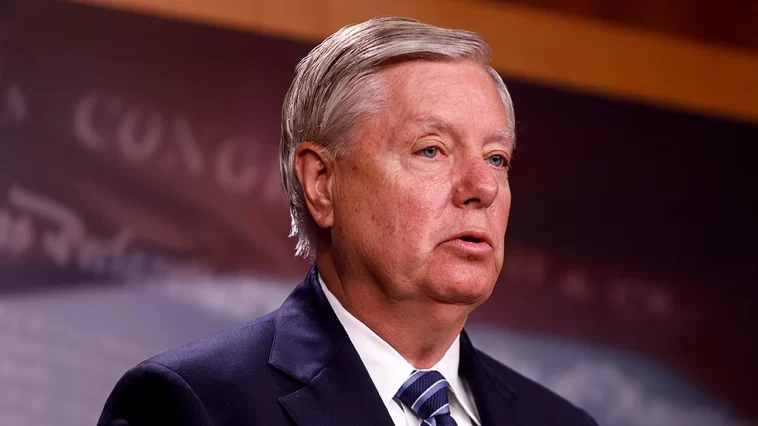Over the past weekend, Senator Lindsey Graham of South Carolina shared a strategic outlook regarding the electoral prospects between the GOP’s potential candidate Donald Trump and his Democratic counterpart, Vice-President Kamala Harris. He projected that Trump has strong chances of defeating Harris, contingent upon an approach that focuses on policy debate. The central idea behind this strategy is to put Harris into a corner where she’ll have to defend her policy ideas, which Graham describes as disastrous.
In an insightful interaction with Kristen Welker on NBC News’ widely-followed ‘Meet the Press,’ the Senator threw light on Harris’ political orientation, stating that she epitomizes unprecedented liberalism in the history of American presidential nominations. Drawing on her policy inclinations, he even drew a comparison between her strategies and those employed by the erstwhile Soviet Union- a reference to her support for price controls as a solution to inflation.
Graham underscored several policy stances which, according to him, Harris supports, and they range from the abolition of private health care to reparations. He further expressed concerns about her opposition towards fracking and her endorsement of the Green New Deal. With an evident intention to shift the campaign focus to policy talk, Graham believes that Harris will have a challenging time defending these decisions.
The South Carolinian senator insisted that examining and debating the Vice President’s policy choices should be the key focus, arguing that any day when discourse on these subjects is missing is advantageous for Harris and unfavorable for their side. This stance emphasizes the need to keep the discussion stringently tethered to policy matters.
NBC’s Welker, however, intervened to deflect an assertion that the Vice President is against fracking. Interestingly, Harris previously suggested her support for a fracking ban, a position she has not retreated from. Her stance appears to create tension within the energy discourse, particularly considering aspects of the Green New Deal.
Graham found this contradiction noteworthy, quizzing, ‘How can you be for the Green New Deal and not be opposed to fracking?’ The apparent contradiction seemed to be a sticking point in the discussion, however, Welker did not provide a clear answer to the posed query and chose to steer the conversation forward.
The interview drew to a close with Graham highlighting the promotional potential of GOP’s rising stars – governors Ron DeSantis and Glenn Youngkin. He firmly asserted his belief that the duo would be instrumental in creating the necessary groundwork for Trump’s campaign and garnering the necessary electoral momentum.
However, Graham held out a glimmer of hope for Trump emerging victorious in the final days leading up to the election. He postulated that Trump’s success would hinge on him laying out a clear plan demonstrating his intent to address and rectify critical issues such as border security and economic inflation.
Graham hammered home the point that unfavorable scenarios under the current Harris/Biden administration are potential talking points for the Republican campaign. He drew attention to the elevated gas prices and skyrocketing mortgage rates that Americans are grappling with. High grocery costs were another issue he identified, casting a spotlight on a trio of economic disadvantages that many American households currently face.
In conclusion, Graham emphasized the importance of adopting a policy-centric approach as the best path forward to the White House. In other words, he urged focusing on practical solutions to real problems should take precedence over grandstanding or character attacks.
In summary, the conversation with Senator Graham laid bare the Republican’s game plan, which pivots on a sharp policy-focused critique of VP Harris’s liberal positions. In the Senator’s view, this strategy is likely to put pressure on Harris, forcing her to defend potentially unpopular moderate-left positions.


